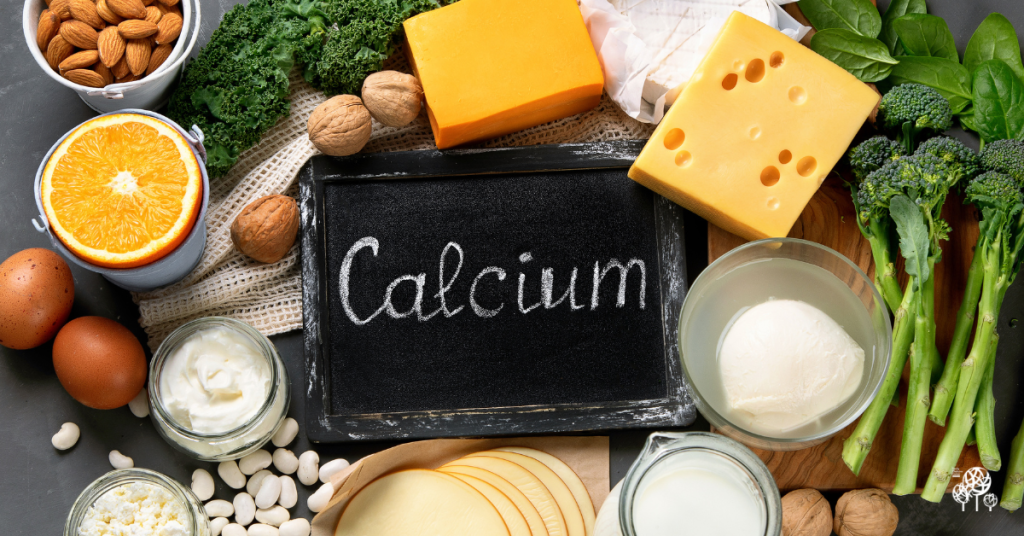Going beyond calcium to explore the essential vitamins and minerals that quietly keep your bones strong for life.
When it comes to bone health, calcium usually gets all the attention—and for good reason.
But calcium doesn’t act alone. Your bones are living tissue, constantly breaking down and rebuilding—and that process requires a team of nutrients working together behind the scenes.
We take a whole-body approach to bone strength, helping patients understand the role of diet, supplements, and lifestyle in preventing osteoporosis and promoting long-term skeletal resilience.
Here’s a breakdown of 7 key nutrients your bones rely on—and where to find them in your everyday meals.
🦴 1. Calcium – The Building Block of Bone
Calcium gives bones their structure and strength. It’s especially important during growth phases (childhood, adolescence) and later in life when bone breakdown speeds up. But without supporting nutrients, calcium can’t do its job effectively.
👀 What to watch for: Diets low in dairy, leafy greens, or fortified foods may not provide enough calcium.
💡 Pro tip: Get calcium from both dairy (yogurt, cheese, milk) and non-dairy sources like tofu, almonds, chia seeds, and kale.
💊 2. Vitamin D – The Gatekeeper for Calcium Absorption
Vitamin D helps your body absorb calcium and regulate bone turnover. Without it, even a calcium-rich diet may fall short. Sun exposure triggers natural vitamin D production—but supplementation may be needed in people with limited sun exposure or absorption issues.
💬 Sound familiar? You spend most of your day indoors or often wear heavy sunscreen.
💡 Pro tip: Try 10–20 minutes of early morning sun several days a week, or ask your provider about supplements. Fatty fish, egg yolks, and fortified cereals are good dietary sources.
🌿 3. Magnesium – The Bone Metabolism Regulator
Magnesium helps convert vitamin D into its active form and plays a role in forming the crystal structure of bones. Low magnesium levels can quietly impair bone growth and mineral density.
🤓 Interesting note: About 50–60% of the body’s magnesium is stored in the bones.
👀 What to watch for: Diets high in processed foods tend to be low in magnesium.
💡 Pro tip: Load up on magnesium-rich foods like pumpkin seeds, legumes, avocados, spinach, and whole grains.
🧀 4. Vitamin K2 – The Calcium Director
Vitamin K2 helps “direct” calcium into bones and teeth instead of soft tissues (like arteries), reducing the risk of both osteoporosis and arterial calcification. It activates proteins that bind calcium to the bone matrix.
💬 Sound familiar? You’ve heard of vitamin K1 (found in leafy greens) but never really considered K2.
💡 Pro tip: K2 is found in fermented foods like natto, sauerkraut, and aged cheeses. Some supplements also include it with D3 for synergistic support.
🫘 5. Phosphorus – The Silent Supporter
Phosphorus works with calcium to form hydroxyapatite—the primary structural component of bones. It’s essential for bone rigidity, but most people get enough from a balanced diet.
🤓 Interesting note: Too much phosphorus from processed foods or sodas can actually disrupt calcium balance.
👀 What to watch for: Overconsumption of soft drinks, especially colas, which contain added phosphates.
💡 Pro tip: Stick to whole food sources like lentils, nuts, seeds, fish, and lean meats.
🍗 6. Protein – The Framework for Bone Matrix
Bones aren’t just minerals—they’re also made of collagen, which requires adequate protein intake. Too little protein can impair healing and increase fracture risk, especially in older adults.
💬 Sound familiar? You’re eating “clean” but cutting back on protein without realizing its role in bone health.
💡 Pro tip: Include plant-based proteins like lentils, beans, quinoa, and tofu in your meals. Aim for consistent intake throughout the day—not just at dinner.
🧂 7. Zinc – The Underrated Repair Mineral
Zinc supports bone growth and mineralization, especially during times of healing or growth. It also plays a role in immune function, which indirectly supports bone recovery after injury.
👀 What to watch for: Hair thinning, brittle nails, or slow wound healing may be signs of low zinc intake.
💡 Pro tip: Incorporate zinc-rich foods like chickpeas, pumpkin seeds, cashews, and whole grains into your regular rotation.
Stronger Bones, One Bite at a Time
Your bones are constantly evolving—breaking down and rebuilding with every passing day. The nutrients you feed your body play a powerful role in how well your skeleton holds up over time. It’s not just about popping a calcium pill—it’s about building a balanced, supportive diet that nourishes your bones from the inside out.
At Family Medicine Center, we offer bone density testing, nutrition counseling, and personalized prevention plans for patients of all ages and risk levels.
📞 Call (242) 702-9310 to schedule a bone health consultation
📅 Book an appointment and start fueling your future with the nutrients that support every step, stretch, and stride.

